
15 minute read
Feast Day
Feast Day Supporting MWIA and the Loreto Projects in Zambia
In this Loreto Year of Sincerity, it has been our privilege to advocate the importance of aligning our values with our actions.
The value of sincerity poses a unique challenge, asking all of us to examine what it is we truly value and moreover what good we want to see achieved, and so then how we will act because of our inner beliefs. This is a notion featured in our school theme “let our actions be a reflection of our hearts’ true intention”; it reminds us of the need to approach life with compassionate hearts and a strong sense of social justice if we are to be true Loreto women. It is in this spirit, that we as a school community work together to ensure that the values we hold can be used to achieve good for others in our wider Loreto family. This was demonstrated through our annual Happy Week; a joyous and highly anticipated week that is an integral part of every Loreto girl’s experience. It is time of fun and celebration yet equally, an opportunity to recognise the privilege with which we are all blessed. This year we focused our attention towards raising funds for a Mary Ward International Project that aims to make a difference in community development, education and health in disadvantaged and remote communities globally. It is our great privilege to support the people of Lukulu, a small and very remote township located in Zambia. The Loreto Sisters run two extraordinary initiatives in Lukulu, a baby milk program and a teaching program. Malnutrition in Lukulu is amongst the highest in the world and devastatingly 40% of the children under the age of five have stunted growth. The baby milk program aims to provide milk formula to orphaned babies and for babies whose parents have HIV, as they are unable to be breast fed due to the risk of transmission. The Loreto Sisters provide formal teaching training and financial support to untrained teachers to complete Grade 12 opportunities. It is imperative that teachers are trained adequately if the students they teach are to grow, learn and flourish and in order to break the cycle of poverty. This year, the funds raised from the generosity of our school community will go directly towards funding a vehicle for this community and these projects. There are very few sealed or well-maintained roads in Zambia and driving between townships is unsafe without a reliable vehicle. This will enable these initiatives to further develop and in addition to this, will further support mothers in childbirth, impoverished and disabled children and adults to access specialised treatment, and the elderly who are unable to attend church on their own. In keeping with tradition, the culmination of Happy Week is Feast Day and the whole school community celebrated Mass at St Patrick’s Cathedral, followed by the much-anticipated Feast Day fête, which was nothing short of a whole school party. Students enjoyed dancing, food stalls, dress ups, second hand clothing stalls, games, a haunted house and more. To the strains of ABBA playing by the Stage Band during the
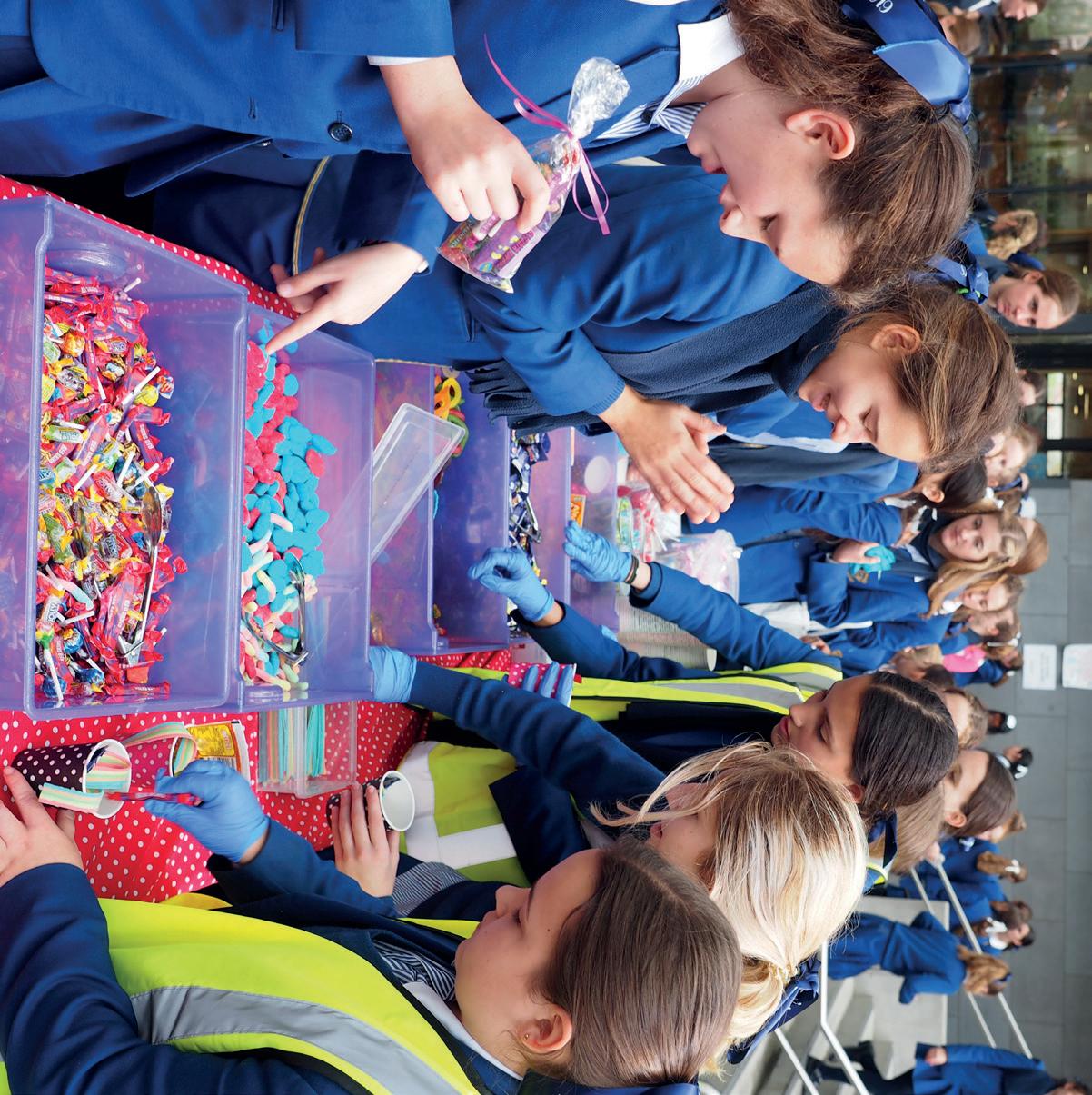
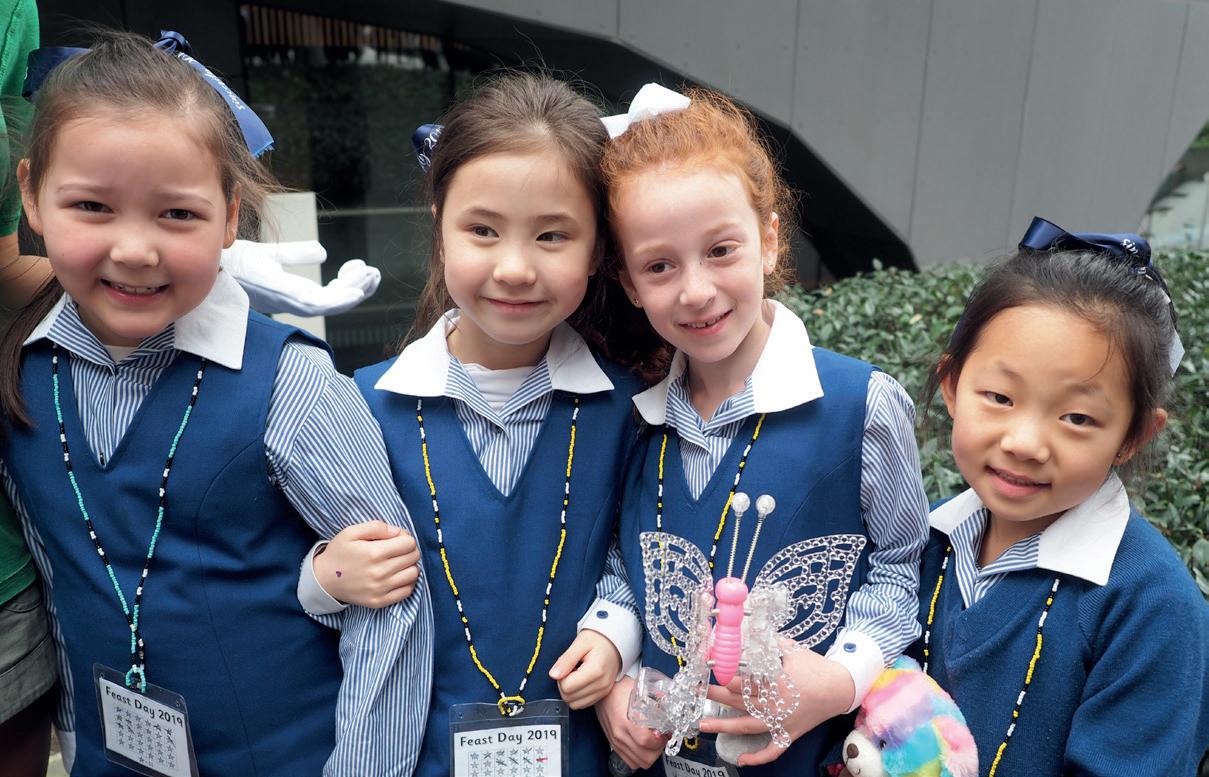
afternoon, all enjoyed the freedom and goodwill of the day organised by student leaders from all year levels. With great pride, our students raised a grand total of $42,000 to donate to Mary Ward International Australia for the work of the Loreto Sisters in Lukulu, Zambia. It is a privilege to support the work of the Loreto Sisters in this way, and to raise awareness about the good work being carried out in many countries of the world, by Loreto women. We sincerely thank the community for their generosity and support of Mary Ward International Australia and their projects. For more information or to donate, please visit: www.mwia.org.au/projects/zambia/
Opposite: Liturgy Councillor, Brianna Dooley (Year 12) reads at Feast Day Mass at St Patrick’s Cathedral. Above: The school community gather together in prayer and thanksgiving at St Patrick’s Cathedral for Feast Day Mass. Left: Year 8 students organise and run a lolly stall for Feast Day. Above: Daphne Burley, Jemima Blackman, Michaela Calombaris and Olivia Chen celebrate Feast Day.
Women’s Agenda Why Does the Catholic Church Ignore Half the Population?
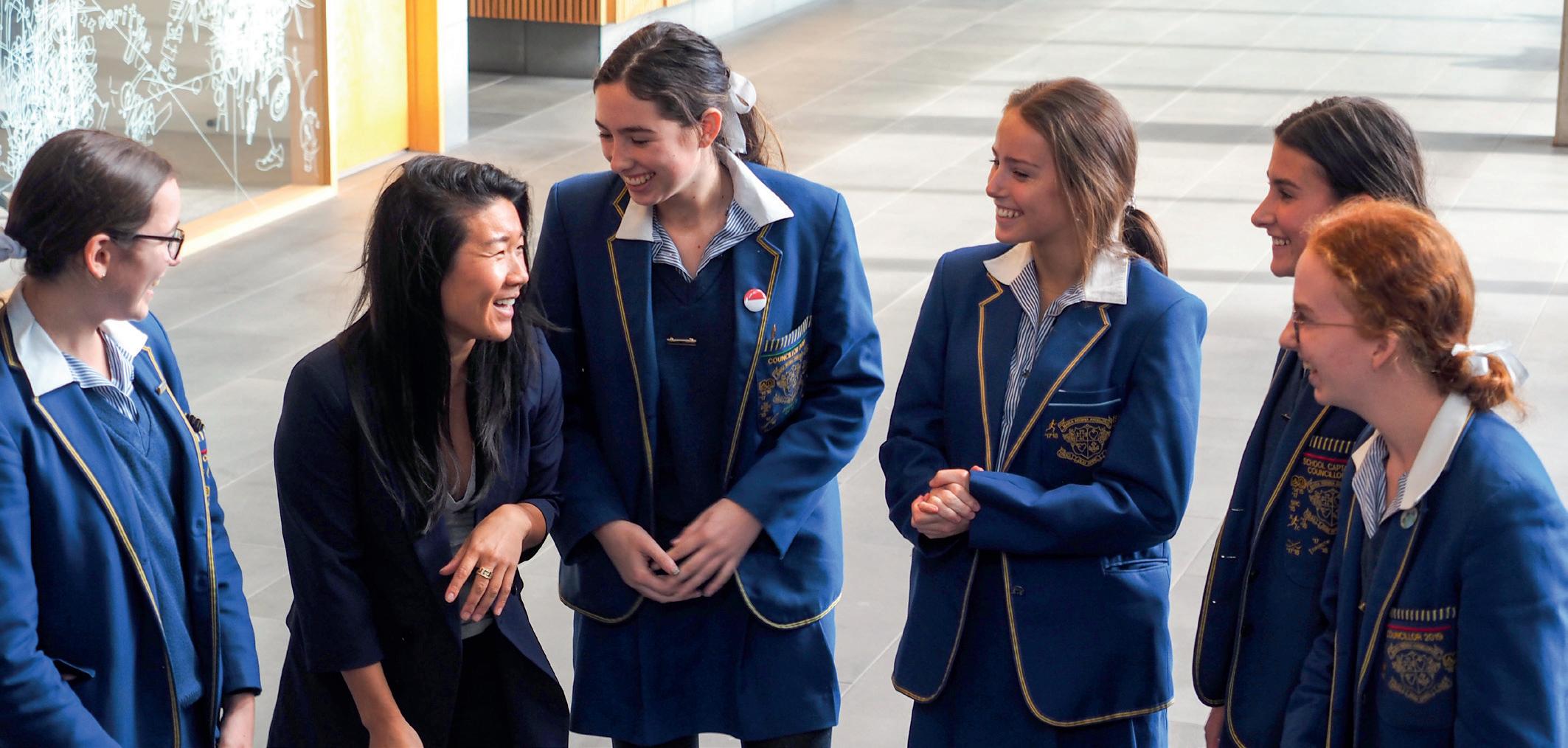
On Friday 21 June 2019, Years 11 and 12 Religious Education students were privileged to hear a lecture from Stephanie Lorenzo, Loreto Normanhurst alumna (2002) and Communications Director of Voices of Faith, whose mission it is to build a prophetic Catholic Church where women’s voices count, participate and lead on equal footing with men.
If you asked me a year ago about the role religion and faith play in my life as a 32 year old, I would have laughed it off and likely told you about my parents’ daily prayers for me to find a husband. My parents, devout Catholics who you’ll find in the front row of their parish weekly, migrated to Australia from the Philippines in the 1980s. They wanted to give their three daughters the best possible opportunities in what they heard was a safe, stable and beautiful country. My dad studied at TAFE, got a building licence and built houses for a living so that he could earn enough money to send his three daughters to a private Catholic school and then to university. I realise how lucky I am to have not paid for my education, and seeing my parents work so hard every day instilled in me a work ethic that led to a solid career throughout my 20s. So forgive me if I find it a little ironic that as soon as 30 kicks in for their youngest girl, the prayers change from ‘we pray she finds a good job, does well in her studies and finds the right house to buy’ to ‘please God let her find a husband and settle down’. I chuckle, and then ask myself, should I blame them? Isn’t this what most societies, irrespective of their culture and outlook, seem to agree on – that a woman’s role is to bear children, stay at home and raise them? Now before you roll your eyes and turn the page, I’ll admit that my 33 year old self, without a doubt, wants to have children and I’d like to be able to stay home with them in their early years. However I can’t help but wonder and fear what major changes having children will mean for my career as a woman and my ability to continue on my professional trajectory. I think about what roles will be available to me when I am ready to go back to the workforce. Will the workforce understand my needs as a parent, will it allow me flexibility, support in training and skill development, help to build my confidence so that one day I might lead the ranks? More than likely, no, although I’ll give credit to the Australian government and businesses who have acknowledged this real conundrum for many women. Yet there are still too few examples of it working in practice to equal the playing field and address the gender gap of women at the top. And what about the Catholic Church? Why is the issue of women’s participation in leadership and decision making roles within this institution such a blind spot? Is it because of the narrow view that has been painted for us over the centuries, a view that’s been embedded into societal and cultural norms? Please don’t misread my point here, I am not trying to diminish or undervalue the role motherhood is. I simply want to be able to know that there are leadership roles that are a possibility for
me, after I have kids, that my career actually continues, not stalls, if I am willing to work for it. For a Church that values motherhood so highly, I would hope they realise the new perspectives, skills and understanding that this life-giving experience could bring to the top. So when can we start to question these norms? What are the possibilities to expand them and how can we better form them for the next generation? I only realised the full force of gender inequality in the leadership of the Catholic Church, when I started working for Voices of Faith. Voices of Faith is a global initiative that is focused on empowering and advocating for religious women and lay people, to have a seat at the table and be part of the decision making structures of their Church. These are roles that are theoretically open to them today, but are almost impossible to access for a variety of reasons including the clerical culture of the Church, and the brotherhood that has protected their own to the point of evading justice when crimes have been committed. It’s a brotherhood that fears change and loss of power. But before I lay blame to only one group, we must look ourselves in the mirror. The millions of lay Catholics unknowingly conforming to the status quo of that patriarchy and remaining silent on the issue. History points to how easily power structures that are cut from the same cloth, left unchallenged and without transparency, accountability or diversity in thought, perspective and skill set, become corrupted.
alive. However, did you know that in 2019, women are still not welcome to sit at the table of its male leaders even in regards to decisions that directly affect them? It would seem that their opinions, expertise and perspectives do not matter. I believe most people of faith, and most Catholics specifically would agree that it makes no sense that decisions affecting us all, cannot be voiced by only half of us. By excluding female voices from the decision making of one of the largest institutions in the world, half the Church remains silent. Enter the Overcoming Silence campaign, Voices of Faith’s first step in targeting millions of Catholics who may or may not realise how rampant gender inequality is in our Church. This online campaign urges you to commit 1 minute of action for change by uploading a photo of yourself and writing a short message to our current leaders demonstrating the urgency and importance of this issue for our Church. Our hope is that by International Women’s Day 2020 this visual petition will have collected thousands, even millions of messages to present to Pope Francis and Curia leaders. The Overcoming Silence website brings together Catholic women and men, as well as nuns, brothers, priests and we even have our first Bishop, who want to see women form part of the decision making and leadership of our Church. It contains free educational resources focusing on the campaign’s three goals, that can be easily downloaded and used at your parish, school or community group. More resources will be added throughout the year, helping educate Catholics on the gender gaps in leadership that can and must begin to change.
I believe most people of faith, and most Catholics specifically would agree that it makes no sense that decisions affecting us all, cannot be voiced by only half of us. By excluding female voices from the decision making of one of the largest institutions in the world, half the Church remains silent.
It’s not a matter of if, but rather, when. The sad fact is, this last decade we have watched absolutely shocked at the unravelling of what the leadership of the Catholic Church enabled in the global abuse crisis; aiding sex offending priests and covering their crimes which led to thousands of innocent lives broken. The moral authority that the Church once stood for, defended and preached, was exposed as hypocrisy at its finest. So where do we even start to effect change? Well, did you know that nuns, who outnumber brothers almost 10 to 1 globally, whose female superiors have the same canonical status as brother superiors, do not have the right to vote at synods convened by Pope Francis? Did you know that women make up less than 3% of leadership roles in the Roman Curia, even though there is nothing in canon law that stops Pope Francis from naming a female cardinal? It is women who make up over 60% of the membership of the Catholic Church, who statistically speaking are more likely to bring their children up in the faith and whose volunteering hours keep parishes I fall into the camp of, dare I say, the millions of disaffected cradle Catholics that go to mass every so often, tick the Catholic box on a census and turn to God in times of crisis. Call it selfish, call me a smorgasbord Catholic, call it whatever you like, but there is no denying that this is the way so many live out their faith. So how do we bring relevance, interest, discernment, dialogue, morality and most of all hope back to their lives? How do we convince women their perspectives and expertise belong at the top, before it’s too late? How do we bring young people back, who have strayed even further and who now tick the atheist box? Here’s one solution, show them half the human race is welcome at the table.
Article as published on 1 May 2019, www.womensagenda.com.au/latest/whydoes-the-catholic-church-continue-to-ignore-half-the-population/
Seeker of Truth, Doer of Justice My Journey with MWIA
Late last year at the end of my four-year Science degree, I decided that my 10 year dream of becoming a veterinarian was no longer relevant. I chose to find work experience within the Loreto network, a community that has consistently provided me with support and opportunities to be an active global citizen.
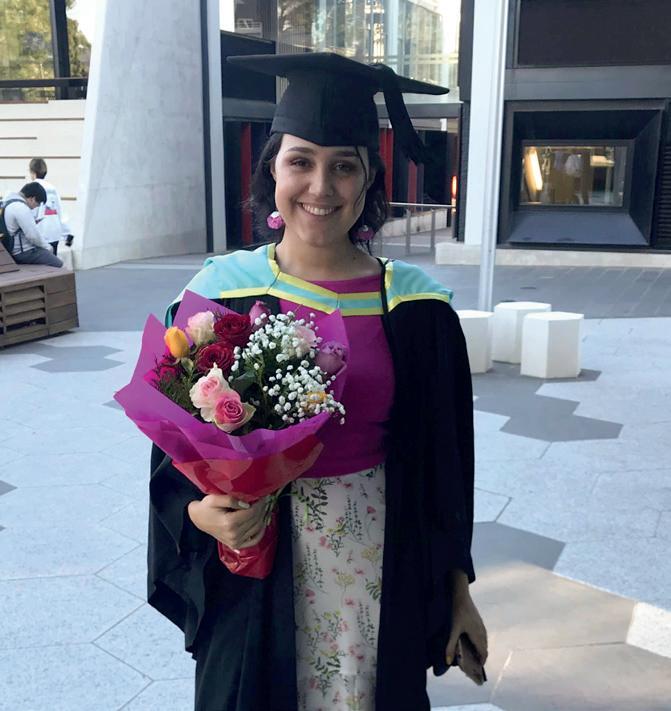
I am sure that most within the Loreto Network recognise the Mary Ward quote “Women in time will come to do much.” For me, now more than ever, it feels like that time.
After graduating, many people do not retain much of a connection to their old school but the favourite part of my Loreto education is that my experience extends beyond what I was taught in the classroom and is still strong five years after graduating. Since then, I have volunteered at the MWIA office in Melbourne, with the Loreto Sisters in India, and soon in NYC where I will work as an intern for Loreto at the United Nations. Mother Gonzaga Barry said: “Leave something behind on which others can build.” This quote always stands out for me. When I think about my career, I tend not to think about what I want to be or where I want to work, but the kind of impact that I want to have. I want the work that I do to be collaborative, foundational and adaptive. It is that quote by Gonzaga Barry, as well as my experience with MWIA in both India and Melbourne, that drove me to apply for an internship at the United Nations in New York, supervised by Loreto Sister, Cecilia O’Dwyer. I completed my studies in Science Advanced - Global Challenges with Honours at Monash University. The course aims to equip young leaders with communication, entrepreneur and leadership skills to tackle adaptive challenges where there is no clear or rational solution. I became aware of the importance of multidisciplinary action when mitigating such issues and developing solutions using not only science, but social sciences, culture and economics. I am excited to work on different issues, affecting different people and places, and working towards developing policy that is considerate, actionable and sustainable.
Earlier this year, I assisted MWIA Programs Manager, Kirstin Del Beato in preparing and reviewing internal policy for the organisation. The MWIA office in Melbourne is shared with other members of the Loreto Centre. I was able to engage with and get to know the Sisters and staff who work in all areas of Loreto. Although the team is small, the reach, impact and ambition of MWIA is incredible. This wasn’t my first experience volunteering for MWIA. At the end of 2016, I boarded a plane to India where I spent a month living with the Loreto Sisters in Siliguri and working with the Darjeeling Mary Ward Social Centre. Throughout high school I was always involved in extracurricular and social justice activities that raised money for the work that Loreto does globally. However, being able to witness the impact first hand in India showed me how sustainable the projects run or funded by MWIA truly are. I’m writing this article at a cafe in Islington, London, at the tail end of a four-month solo trip through Europe. In some ways, I feel a little bit like Mary Ward, who told us to “be seekers of truth and doers of justice”. Throughout this trip and through my experiences with MWIA, I have sought new and challenging opportunities to broaden my knowledge, understanding and experience. I continue my journey to New York as a doer, being a part of a community working towards equality and justice, especially for women and children.
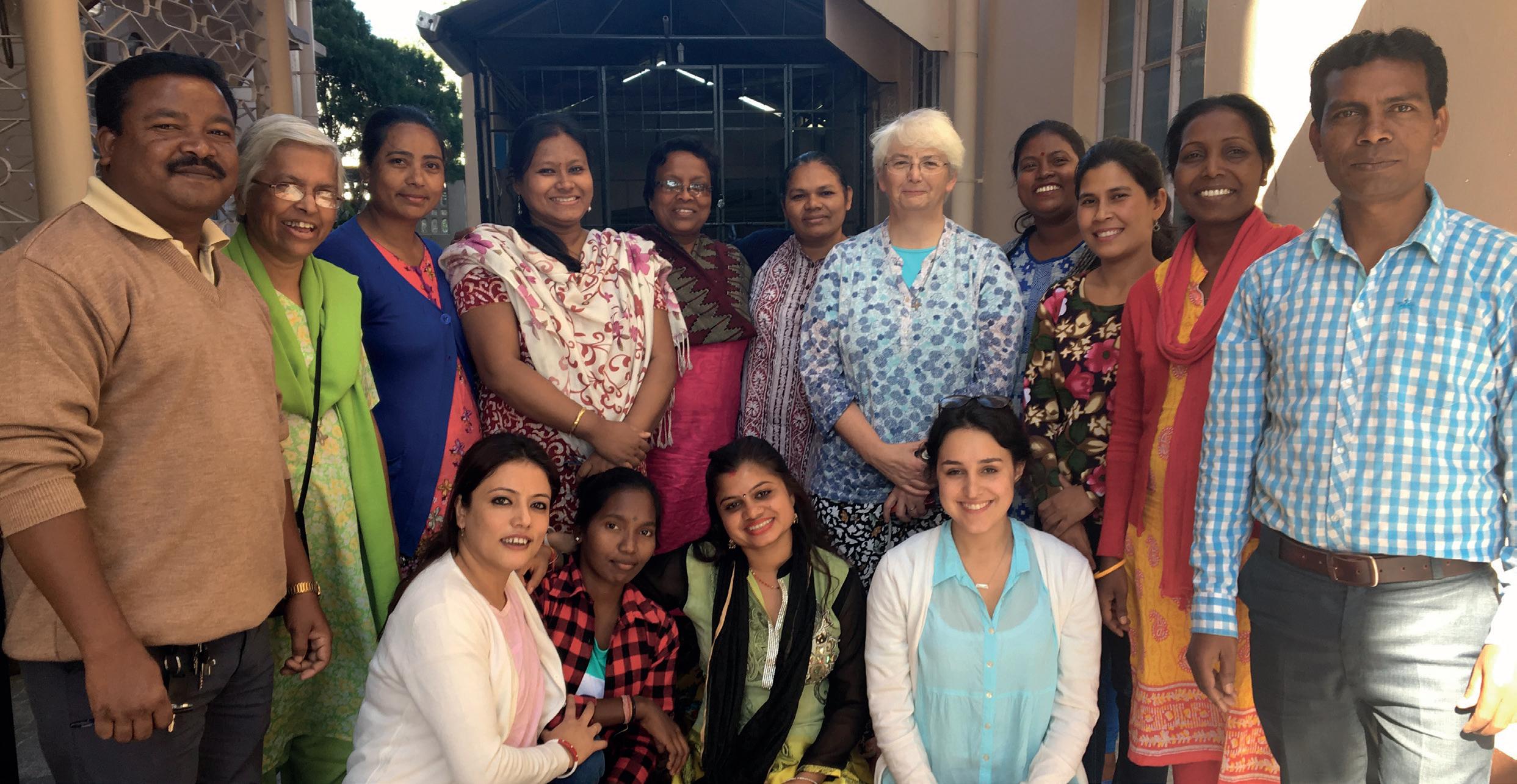
Being a part of the Loreto community means that throughout this trip, I have never felt alone. Whether it be the 30+ Toorak past pupils I met at the London reunion in June, the Loreto and CJ Sisters and staff throughout Europe, or even the Loreto subway station in Paris - the strength and stretch of the Loreto community is comforting, inspiring and encouraging. I always admired Mary Ward at school. Her story was present in our school values, celebrations and songs; however, it has been through my experiences with MWIA that I feel as though I truly understand her. I am sure that most within the Loreto Network recognise the Mary Ward quote “Women in time will come to do much.” I remember it posted on the far wall of our auditorium throughout my time as a student at Loreto Mandeville Hall. For me, now more than ever, it feels like that time.
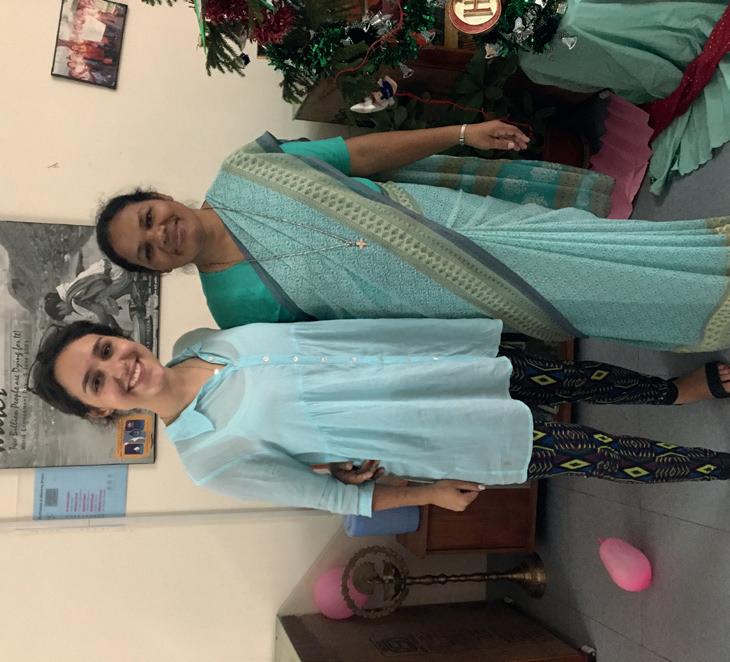
FRANCESCA TORCASIO BARBERIS CLASS OF 2014
Opposite: Francesca graduating in Science from Monash University, 2019 Above and Centre: Francesca involved in MWIA projects in India, 2016, Above Right: Francesca with one of the participants of the Ethical Enterprises Project.
To find out more about MWIA, to donate securely online or to subscribe to MWIA’s Sustain, please visit www.mwia.org.au
MWIA is the Australian and international development organisation of the Loreto Sisters. They strive to make a difference in the areas of education, community development, human rights, social justice, and the empowerment or women and children.
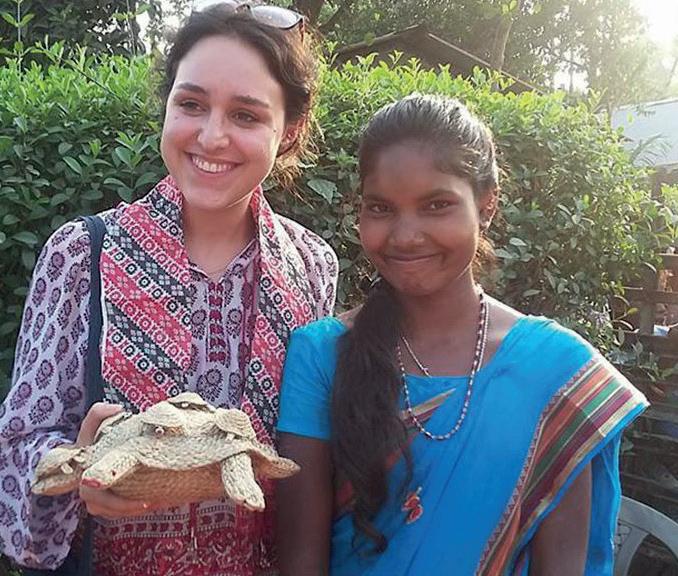
BVA www.mwia.org.au www.mwia.org.au
The MISSION in the year of JUSTICE
FEDERATION Be the Change
Kolkata, India – Brickfield Schools PROJECT UPDATE
DECEMBER 2018 DECEMBER 2019









